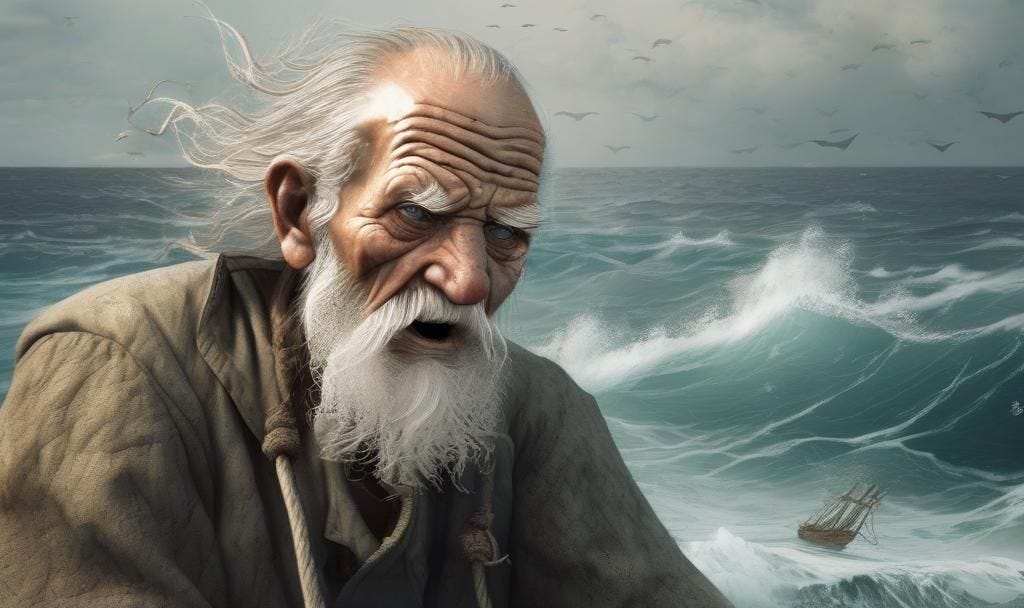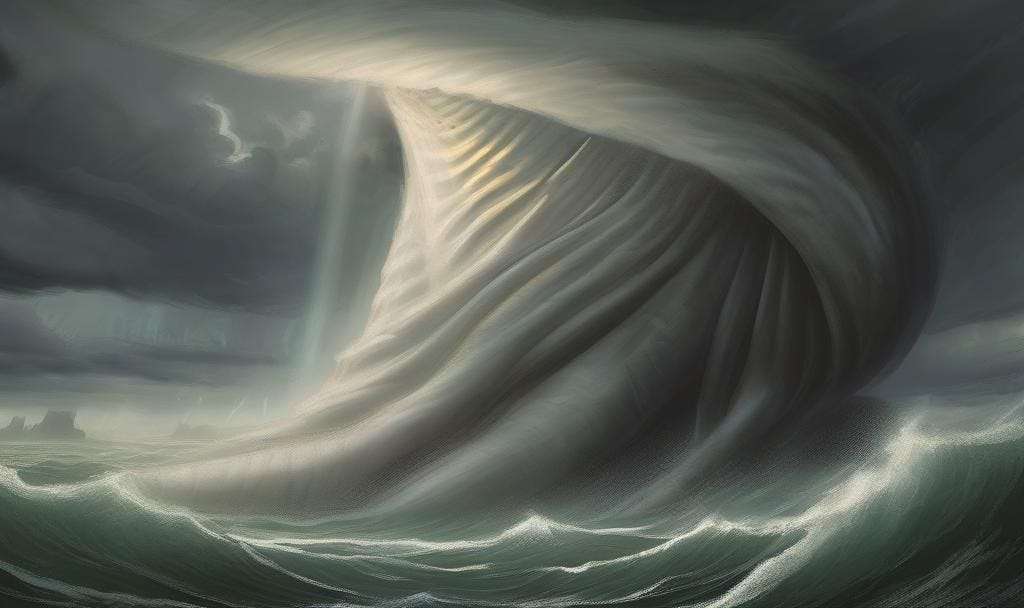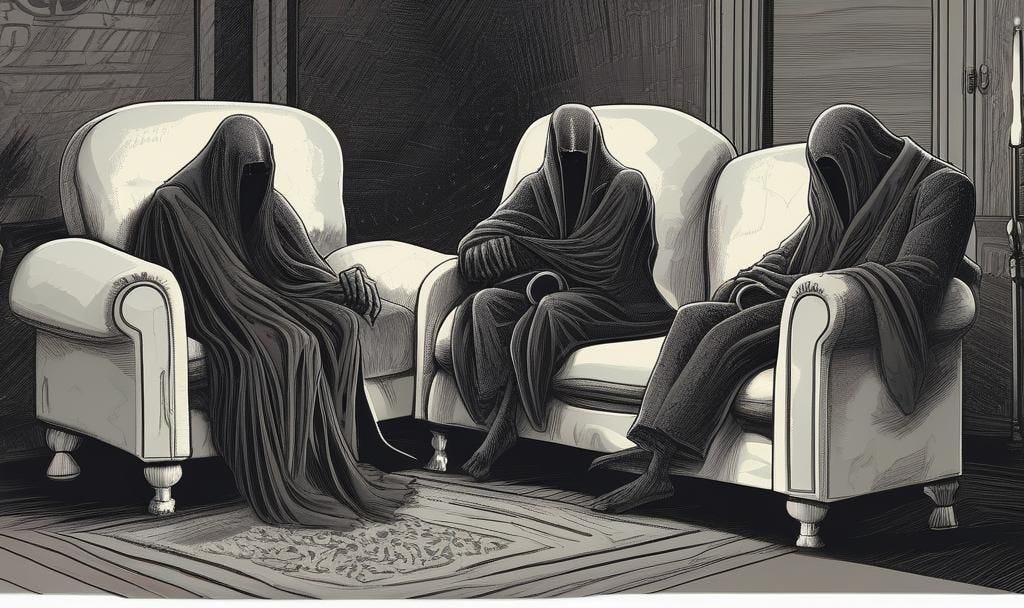The Death of Books: How Deep POV is Killing Literature
Emotional Autopsies of Characters demanded by a formulaic and feminist industry is destroying books and characters--reducting authors into psychoanalysts which exposes their souls to voracious pagans.
Night Fishing
The angler pulled the rod past his head–then, with a flick of his wrist, he cast it deep into the curling mists in a long, slow arc. The reel screamed as the line rushed out, and he watched as his glowing lantern bobber arced into the chilly night air before landing and floating on the grave waters.
He had chosen pungent bait–rotting flesh from a clinic’s dumpster. He knew he would catch some big fish tonight.
The fisher drew out a long granite pipe as his lantern bounced up and down on the mists. As he puffed on his pipe, acrid rings of black smoke rose over him. The smoke hung in the air before it piled down against its will. Soon, the black smoke cloaked his whole body, except for the ember from his long stone bowl and stem.
The lantern float disappeared into the mist, came up, and then he felt a strong jerk. He yanked the rod and began to fight. He methodically pulled his prey toward him as the hook set firmly, but the fish violently fought back.
The lantern bobber moved wildly, flashing its light through the mists. He tracked the battle–alternating between letting the reel run and tightening the line. The fish came closer–losing its freedom by inches. The black smoke flowed around him like grasping tentacles and fingers.
A ferocious current formed around the flaming float as the fish dragged it through the mists, turning the dark clouds into a conflagration. The fish desperately spun, turned, and yanked. Panicked madness carved a chaotic and twisted path. The mists enveloped the fish. The watery fog became a fiery, burning wave of destruction. White, marbled, and stained stones ascended like broken teeth from the darkness–stalking the fish and the hellish fire in its wake. The fish began to sprint from one stone to another—the hook was now too deep for escape.
The rodman puffed harder on his stone pipe. The ember glare grew brighter. Grabbing his reel, he slowly tightened the line. He felt the exhaustion of the fish–resignation of its life. His sharp teeth gripped the churchwarden as he smiled.
The fiery tumult receded to a glowing cinder where the fish was hidden. The lantern float was a bright light coming out of the fog. The fish followed, the mists swirling around its body, trying to hold it back. He laughed.
It was a simple catch—an old, emaciated shadowfish. The fish struggled for breath, lamenting its unjust life. The angler took a long knife and scraped scales off the screaming fish. Then he seized it, struck the complainer hard against the nearest stone, and dropped it into his bag. The stone flashed a brilliant white–a name appeared across the stone’s jagged face, revealing a list of sins.
The fisher of men stoically puffed on his stone pipe, twisting the black tar and stale alcohol bait on his hook. He then added the scales from the first fish to make it more attractive. As he cast his line deep into the night’s mists, the reel screeched like a terrorized ghoul. The moon's gentle glow reflected off his polished finger bones, but he quickly concealed them under his cloak of black smoke. He was determined to fill his bag before leaving the grave mists.
Immersive Point of View: A Reader's Critique
I wrote a story called "Night Fishing" about an otherworldly angler - a dark primal force fishing for souls in grave-misty waters. When I shared it with my writing group, they struggled to understand it because they couldn’t psychologically colonize my character.
“Who was he? Was he a man? Was he a force? What were his thoughts? Where was the dialogue? Why didn’t I name him? What was his motivations?”
The story fails because the guild members want to relate to a Luciferian being rather than understand it. They want inside his head—the head of a dark primal force. This is the problem with modern literature (if this is even the right word).
Modern Literature
Modern Literature’s problem is similar to what I encountered with “Night Fishing.” You see the problem in media like Wicked, A Court of Thorns, Maleficent (Movie), or Lucifer (the TV Show). In these examples are characters who are vehicles that are ultimate and primal forces of evil, and the creators have turned them into relatable human figures—even the greatest forces of evil need to have daddy issues now. Somehow, Lucifer is a literal son of God (Spoiler alert: he is not). And don’t get the facts of the Disney story wrong–fighting the patriarchy as Malificent does is a daddy issue.
That is the point - they aren't human, and they aren't relatable. They are monstrous, partly because they are not human. Aslan is dangerous partly because he is not human. Even Tom Sawyer has a mythic element about him, along with Jim the Nigger. They carry more than just a reflection of my narcissistic self. The characters carry an idea, a germ, of something more significant than the human soul. They take on a primal essence. Characters, well-written, become archetypes. Sometimes, they reflect ancient archetypes; sometimes, they become archetypes we didn’t know we always had.
When an author writes well, he joins his soul to something immortal. Looking into a mirror and finding only yourself (as many people want to do in modern art and literature) is as devoid of meaning as self-searching and self-discovery. There is no internal journey that becomes part of the eternal struggle. Hemingway's fighting with the fish (Old Man and the Sea) or his wartime story (For Whom the Bell Tolls) isn't about the internal struggle within as much as the fight without. It is chasing the eternal--doing the impossible.
Theological Literature
As we stand in Job 39 and Job 40 before the whirlwind, we want God to come down before us. We want to make God like us. We think we can command God. That's Job's sin. God should be relatable. Christianity is full of this terrible flaw all the time. Jesus is just like me. What would Jesus Do? Jesus ain't like you. He was so human and so divine he could live a sinless life. You? You can't go five minutes without being an ape.
We read Job, and we misread it. We can't see the power of God right in front of our faces. God shows us the Leviathan and the Behemoth. He reminds us that he created these giant beasts, and we're just going around demanding that the God who did all this should be so relatable that he explains his inner life and deep POV. Screw that. He doesn't owe it to us. He tells Job to screw off.
When Moses asks to see God's face, God tells him no man can see His face and live. He puts Moses in the cleft of a rock and shows him only His back. Yet here we are, demanding to see inside God's head through Deep POV in our Bible studies and devotionals. We want to make the burning bush a relatable character. We want to know what God thought when He parted the Red Sea. It’s not enough to be in awe of God. We can’t trust the damn man from Galilee unless we can break down his motivations. We become God’s cosmic therapist, putting him on a couch.
We castrate the truths of Revelation. The four living creatures covered with eyes, the seven-headed beast, the rider on the pale horse–we can't let them be terrifying anymore. We have to explain them, psychoanalyze them, and make them digestible. We've forgotten that when John - the disciple Jesus loved - saw the glorified Christ in Revelation, he fell at His feet as though dead. That's what encountering the Other looks like.
We've turned the apocalypse into a self-help book. Remember when the disciples saw Jesus walking on water and were terrified? That's the appropriate response to the supernatural. But modern Christianity wants Jesus to be your boyfriend, your therapist, and your life coach.
I have heard other authors talk about the necessity of writing from an immersive point of view. It allows the reader to become the character and see the world through the character's eyes. This voyeuristic takeover of the character diminishes the reading experience.
Counter-Arguments
As I'm not a published author in any sense of the word, what authority do I have to criticize this highly successful commercialized point of view? I'm a reader.
Here are my five counter-arguments against this porneia of view.
The character loses distance from the reader.
The book becomes a sheepskin I put on as a reader rather than a work I respect as different.
Immersive POV emotionally bonds with the character too intimately rather than learning to bond more casually.
It’s formulaic, lacks invention, and prevents the reader from experiencing unique voices.
It’s trauma-based and more prone to erotica writing than good literature (I’m including Austen and Steinbeck in this critique.)
The reader should not become the character. It’s vile to lose yourself and your identity in someone else. The character can become a friend or an enemy, but never yourself. This type of writing attempts to turn the reader into the character. It’s an inappropriate emotional connection to another mind. Each character isn’t just some words on a page. They have an animus—the spirit of the author.
If you allow a deep POV into your book, you are allowing the reader to take on your spirit and to step into your mind. This is far different from allowing them to examine your mind from the outside as a friend. Every character is a piece of an author. We breathe life into our heroes and our villains. Even the people who show up for two words are a piece of us.
Don’t let people into your soul for commercial success. It’s intrusive and a violation. Don’t prostitute your characters for any reader.
There is no ability to invent or create if you are forced to write like you are a madam curating books and characters for a whorehouse. Do you think Tolkien would be a better author because of the deep pov?
Do you think Twain would be as memorable as an exposed and bleating nerve? All of these books that receive praise for commercial praise will not be on shelves 100 years from now, and they will not be making movies about them 200 movies from now.
They are not immortal because they are too relativistic. When the reader is so injected into the book, like a man is injected into a woman, then when he leaves satiated, he doesn’t return. This man looks for the next book, the next character to conquer and control. It’s an animalistic way to read. It’s a pagan way to read a book.
Feminist Critique Expansion
Except the problem isn’t men. The problem is that women readers want their characters to be dominated and controlled. Women who live in trauma have bought into a brand of feminism that has taught them to control everything around them—even characters in books.
These women trust everyone so little that they don’t even trust book characters unless they can see every single thought they have. Even thoughts that don’t tell the story or further explain the character. It’s emotional pornography and manipulation.
The rise of Deep POV parallels the rise of trauma-informed everything. We've created a culture where nothing can remain mysterious; nothing can be accepted at face value. Every character needs a psychological autopsy–after we kill it. Feminism has to murder the mysterious. It buries it, lets it rot, and then brings it back up, exhuming its decomposing corpse to feed on it. This is what has happened to modern literature (which, again, is not the correct word).
Look at what's happened to our fairy tales. We can't let the Evil Queen/Witch/Puppy Killing Bad Driving Super Witch be evil any more–she was abused, suffered, or was traumatized. It ain’t her fault.
Cinderella needs to be "empowered."
Snow White needs agency–a man cannot save her.
It's not enough for Beauty to love the Beast–now she has to be ravaged repeatedly from this Deep POV so that the reader feels every claw mark.
We've turned every fairy tale into a therapy session. The modern female reader has been taught that unless she can control and validate every thought in a character's head, she's being victimized by the patriarchy. It's a peculiar form of literary helicopter reading–nothing can be left to mystery or imagination. Nothing happens behind closed doors, nothing happens off-screen, and nothing is implied.
Every character needs to be supervised, their thoughts monitored, and their motivations crystal clear. It is a pagan-fed dystopian and postmodern panopticon that would make 1984’s Ministry of Truth a misunderstood Divine Feminine Girl Boss. This is helicopter reading, and it's killing literature.
This obsession with psychological control isn't empowerment–it's fear dressed up as feminism. Real empowerment would be the ability to encounter other people without vivisecting them. We don’t need to turn every book into True Crime podcasts, nor do we need our books to pretend the author understands every character to this level of psychological realism. It's akin to the super-realism that exists in the art world.
You may see it once, but don’t return to it unless you have zero taste.
Turing Test and the Uncanny Valley
The problem is that it fails the Turing test in understanding characters. It creates an uncanny valley that forces the reader to give up suspension of disbelief and force them to become the character in order to maintain any sort of illusion. This view of literature is a disservice to both the reader and the author.
Real strength would be facing mystery without demanding it explain itself. Instead, we've created a literary culture where everything must be safe, everything must be understood, and everything must be relatable.
And here's the real irony: in trying to make everything safe and understood, we've made it impossible to write anything truly dangerous, revolutionary, or feminine. The wild woman of folklore, the mysterious witch, the unknowable goddess—these powerful female archetypes can't exist in Deep POV. They're too dangerous, too mysterious, and too Other. Maleficent becomes tame. She becomes knowable and just like us. We fall for the conceit that we can become like her. The thing is, young women aren’t meant to become like the dragon lady. She is a cautionary tale to women. She is meant to be a foil to Aurora.
Her actions lead to chaos and destruction and threaten the youth and vitality of Aurora. She doesn’t just threaten the kingdom; she threatens the well-being of virtue and young women. Older women, who take on the dragon lady archetype, are a dangerous motif. They are primal. They aren’t meant to be befriended. Yet it says a lot about a culture with so many dragon ladies that want to turn Maleficent into the heroine so it can corrupt Aurora.
We've traded the power of the mysterious virtuous feminine for the false security of the completely psychotic, out-of-control feminine whore.
Conclusion
This Deep POV is the equivalent of emotional sadomasochism in the literary world. It brutalizes the relationship between the character, reader, and author. It forces the author to write unnaturally to meet a market demand for control over the uncontrollable—another person's mind. It’s a conceit of feminism—postmodern pagan culture—to control the spirit of others.
I won’t write this way. I won’t surrender my characters to my readers. I want my readers to become friends with my characters. As an author, please do not let your readers possess your characters; in a way, they possess you.











Feminists want to be gods.